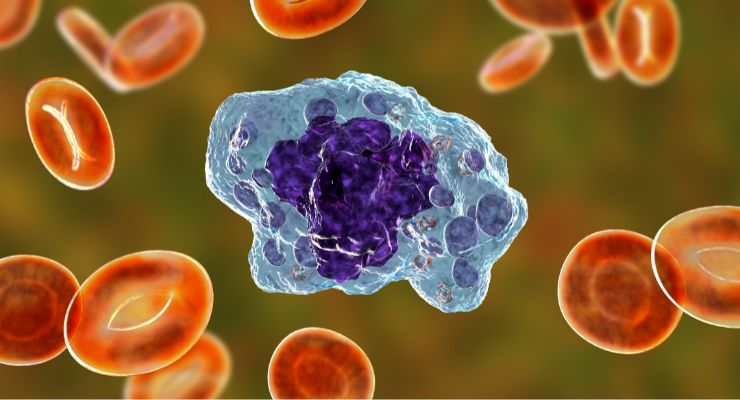04.17.24
A postbiotic ingredient marketed by Kerry Group as Wellmune may support the body’s innate immune function, according to a newly-published in vitro study.
The proprietary baker’s yeast 1,3/1,6 glucan postbiotic, when administered to immune cells called monocytes and macrophages, primed anti-inflammatory and antimicrobial activity, thus demonstrating the potential to help these cells find pathogens, the authors, writing in iScience, concluded.
“To determine if β-glucans from more ubiquitous fungal species like Saccharomyces cerevisiae modulate myeloid function through trained immunity, we employed a well-defined, intact yeast whole-glucan particle (WGP). We compared it to other β-glucans, in an effort to define the structural and signaling requirements for immune training in monocytes and macrophages in vitro and also in mice in vivo,” the authors wrote. “Although a variety of β-glucan preparations can signal through Dectin-1 to drive pro-inflammatory responses, only relatively pure, non-soluble particulate β-glucans trigger the phagocytic synapse and internalization of the β-glucan-Dectin-1 complex, to drive metabolic reprogramming required for trained immunity. This non-soluble form of yeast WGP also enhances myelopoiesis and macrophage function when administered to mice, pointing toward therapeutic approaches to drive trained immunity in humans.”
Consumer behavior has shifted to a more proactive approach to health, and as such, the concept of “training” the immune system has gained significant recognition, Kerry Group reports. The new study demonstrates that Wellmune may address this demand by modulating the inflammatory and antimicrobial behavior of monocytes and macrophages, which are each critical components of innate immunity.
The new findings, which are consistent with more than a dozen other clinical studies, suggest that the postbiotic may improve the energy utilization of immune cells, so that they can more effectively combat potential threats, according to the authors. Clinical research has provided evidence that the unique source, structure, and mechanism of action of Wellmune can support measures of immune function in both adults and children.
“The surge in the market for immune health products over the past decade has been remarkable, and Wellmune’s clinically proven capacity to train the immune system stands as a true beacon of innovation for the industry,” said Jordan Dow, vice president of Kerry ProActive Health. “Wellmune is a one-of-a-kind solution proactively tackling the pressing health and wellness concerns of our customers. With its studied capabilities for immunity defense, we’re providing a solution that not only fosters overall health and well-being, but also sets a premium standard for the industry.”
The proprietary baker’s yeast 1,3/1,6 glucan postbiotic, when administered to immune cells called monocytes and macrophages, primed anti-inflammatory and antimicrobial activity, thus demonstrating the potential to help these cells find pathogens, the authors, writing in iScience, concluded.
“To determine if β-glucans from more ubiquitous fungal species like Saccharomyces cerevisiae modulate myeloid function through trained immunity, we employed a well-defined, intact yeast whole-glucan particle (WGP). We compared it to other β-glucans, in an effort to define the structural and signaling requirements for immune training in monocytes and macrophages in vitro and also in mice in vivo,” the authors wrote. “Although a variety of β-glucan preparations can signal through Dectin-1 to drive pro-inflammatory responses, only relatively pure, non-soluble particulate β-glucans trigger the phagocytic synapse and internalization of the β-glucan-Dectin-1 complex, to drive metabolic reprogramming required for trained immunity. This non-soluble form of yeast WGP also enhances myelopoiesis and macrophage function when administered to mice, pointing toward therapeutic approaches to drive trained immunity in humans.”
Consumer behavior has shifted to a more proactive approach to health, and as such, the concept of “training” the immune system has gained significant recognition, Kerry Group reports. The new study demonstrates that Wellmune may address this demand by modulating the inflammatory and antimicrobial behavior of monocytes and macrophages, which are each critical components of innate immunity.
The new findings, which are consistent with more than a dozen other clinical studies, suggest that the postbiotic may improve the energy utilization of immune cells, so that they can more effectively combat potential threats, according to the authors. Clinical research has provided evidence that the unique source, structure, and mechanism of action of Wellmune can support measures of immune function in both adults and children.
“The surge in the market for immune health products over the past decade has been remarkable, and Wellmune’s clinically proven capacity to train the immune system stands as a true beacon of innovation for the industry,” said Jordan Dow, vice president of Kerry ProActive Health. “Wellmune is a one-of-a-kind solution proactively tackling the pressing health and wellness concerns of our customers. With its studied capabilities for immunity defense, we’re providing a solution that not only fosters overall health and well-being, but also sets a premium standard for the industry.”




























